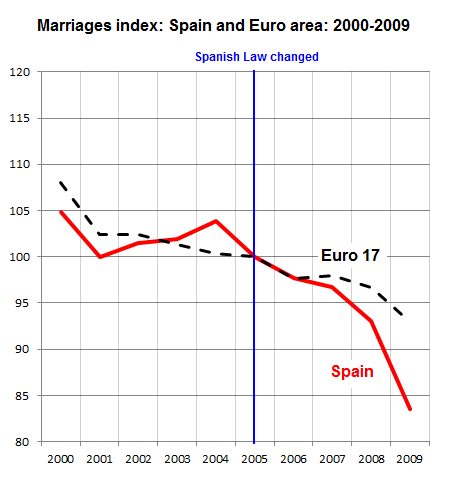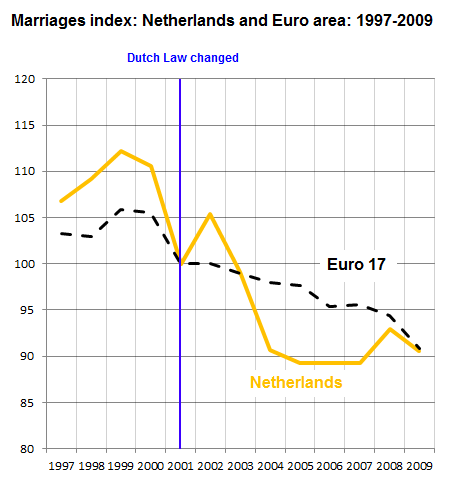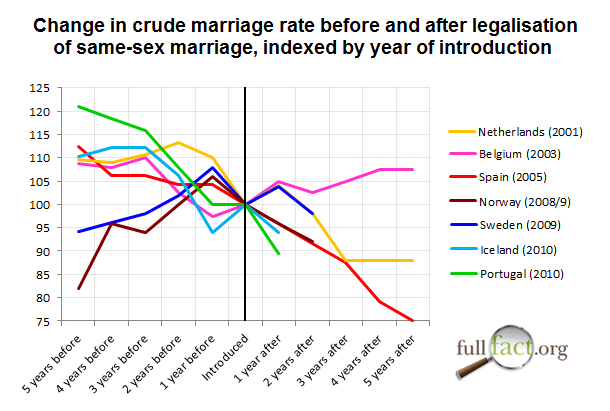Will fewer straight people marry if gay people can?
"Gay Marriage: Tory MP Says Fewer Straight People Will Marry If Gay People Can"
"Given that marriage rates in Spain and Holland collapsed after the introduction of same-sex marriage, does she [Maria Miller] not fear that in this country even fewer couples intending to have children will choose to marry?"
Mark Pawsey MP, House of Commons reported in Huffington Post, 12 December 2012
Yesterday the Culture Secretary, Maria Miller, announced that legislation to legalise same-sex marriages will be brought forward next year.
Her remarks sparked controversy after it was suggested that the Church of England and Church in Wales would not be included in plans to allow religious institutions to opt in to the proposals.
However new concerns emerged today that legalising same-sex marriage will actually see fewer people get married. Conservative MP Mark Pawsey cited Spain and Holland's experiences as supporting evidence.
Where is same-sex marriage legal?
Same-sex marriage is legal in many regions or states, but only 11 countries have passed national laws allowing same-sex marriages (beyond civil unions or partnerships):
Netherlands (2001)
Belgium (2003)
Canada (2005)
Spain (2005)
South Africa (2006)
Norway (2009)
Sweden (2009)
Portugal (2010)
Iceland (2010)
Argentina (2010)
Denmark (2012)
France and Uruguay look like likely candidates to join this list in the near future, along with the UK if the Government's plans are approved.
What happened when these countries legalised same-sex marriage?
Some of the countries have only legalised same-sex marriage in the last few years, so data on how the laws have affected the marriage rate is limited. However, Eurostat provide a useful database of comparable marriage levels in most European countries, and some data is available for the wider world as well.
Taking the European picture for ease of comparison, we can index the changes in marriage levels since same-sex marriage was legalised in each country. The Euro 17 area overall (countries that use the Euro) makes a useful comparator as data for this is also available for all relevant years. Obviously, an extension of the marriage franchise in each country might have an upward impact on the levels, so we have to bear this in mind.
Taking first the case for Spain:

In the absense of any further study on the effect of the Spanish legislation, we can't draw too many conclusions from this data, except to observe that there does seem to have been a marked drop in Spanish marriages in the years following the legislation, although marriage levels fell across the Euro 17 countries (which includes Spain) as well.
The case is similar for the Netherlands:

Overall marriage levels rose in the Netherlands, although we don't know how the heterosexual marriage rate changed, so this could merely be a result of an extended franchise. However marriages have fallen since 2004 more steeply than the general decline across the Euro area as a whole.
But the most interesting measure is to take all the other European countries that have legalised same sex marriage to see if marriages also fell. As is clear, this isn't universally the case:

Belgium legalised same-sex marriage in 2003. In the immediate years after, there has been if anything an upward trend in the number of marriages there.
Conclusion
The most general message to take is that while some states, such as those specified by Mr Pawsey, do show a correlation between legalising same-sex marriage and falling levels of marriage (although, crucially, not necessarily a causation), other countries didn't show this at all, and some even saw modest increases in marriage levels immediately following the new laws.
Without further study it's impossible to account for the state-specific factors such as the level of public support for the legalisation in the first place.
The analysis also doesn't tell us how the heterosexual population would react to a change in marriage legislation. This isn't good news for readers of the Huffington Post's headline eager to find evidence for this startling claim.
In any case, in the absence of more detailed studies of the effects of same-sex marriage legislation, a mere appeal to marriage statistics isn't going to answer this question, and we shouldn't treat the citation of some countries' marriage rates as sufficient evidence.